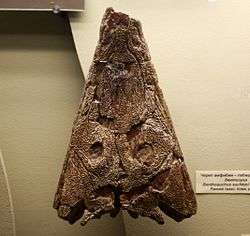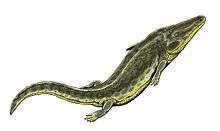Benthosuchus
| Benthosuchus Temporal range: Early Triassic | |
|---|---|
 | |
| Skull of Benthosuchus sushkini | |
| Scientific classification | |
| Kingdom: | Animalia |
| Phylum: | Chordata |
| Order: | †Temnospondyli |
| Suborder: | †Stereospondyli |
| Family: | †Benthosuchidae Efremov, 1937 |
| Genus: | †Benthosuchus Efremov, 1937 |
| Species | |
| |

Benthosuchus is an extinct genus of temnospondyl amphibian from the Early Triassic of Russia. The genus was named in 1937, and the type species, Benthosuchus sushkini, was named in 1940. Benthosuchus has traditionally been considered a member of the temnospondyl superfamily Trematosauroidea, and the family Benthosuchidae was established in 1940 to include Benthosuchus and the related trematosauroid Thoosuchus. Some recent phylogenetic studies have removed Benthosuchus from Trematosauroidea entirely, placing it as a closer relative of Mastodonsauroidea, another group of Triassic temnospondyls. Other studies retain Benthosuchus within Trematosauroidea, but since Benthosuchus and Thoosuchus have successively basal positions on these trees they form a paraphyletic grouping, not a valid clade.[1] In either case, Benthosuchidae is a monotypic family containing only Benthosuchus.
Description
Benthosuchus skull is about 0.75 m long (it is comparatively short in young individuals but lengthens with age), and the overall body length is about 2.5 m. It existed in widely overflowing rivers of the East Russian Depression.[2]
Phylogeny
Benthosuchus is traditionally considered a close relative of a group of temnospondyls called capitosaurids. In particular, it bears a close resemblance to the capitosaurid Wetlugasaurus. Many of the early large-scale phylogenetic analyses of temnospondyls place Benthosuchus within a clade called Capitosauria. However, more recent analyses such as that of Fortuny et al. (2011) recover Benthosuchus within another clade called Trematosauria. Occasionally it is grouped near the trematosaurid family Trematosauridae as a basal member of the group Trematosauroidea.[3] Fortuny et al. found that Benthosuchus positioned outside Trematosauroidea as a more basal trematosaurian. Below is a cladogram from Fortuny et al. (2011) showing the phylogenetic placement of Benthosuchus:[4]
| Stereospondyli |
| |||||||||||||||||||||||||||||||||||||||||||||||||||||||||||||||||||||||||||||||||||||||||||||||||||||||||||||||||||||||||||||||||||||||||||||||||||
References
- ↑ Damiani, R.J.; Yates, A.M. (2003). "The Triassic amphibian Thoosuchus yakovlevi and the relationships of the Trematosauroidea (Temnospondyli: Stereospondyli)" (PDF). Records of the Australian Museum. 55: 331–342. doi:10.3853/j.0067-1975.55.2003.1388.
- ↑ http://encyclopedia2.thefreedictionary.com/Benthosuchus
- ↑ Shishkin, M.A.; Sulej, T. (2009). "Early Triassic temnospondyls of the Czatkowice 1 tetrapod assemblage" (PDF). Palaeontologica Polonica. 65: 31–77.
- ↑ Fortuny, J.; Galobart, À.; Santisteban, C. D. (2011). "A New Capitosaur from the Middle Triassic of Spain and the Relationships within the Capitosauria". Acta Palaeontologica Polonica. 56 (3): 553. doi:10.4202/app.2010.0025.